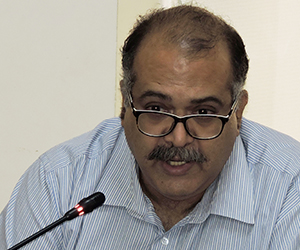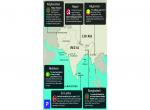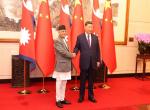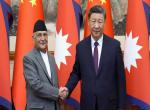During a visit to Afghanistan a couple of months ago, many top Afghan officials and politicians insisted that while the security situation was precarious and the political situation was fragile, the real cause for alarm was not so much the danger of the Taliban sweeping through the country as it was the plummeting confidence among Afghans and foreigners in the ability of the Afghan state to resist, much less defeat, a Taliban onslaught. Despite the Afghan National Army (ANA) and Police vindicating themselves against the Islamist insurgents on a number of occasions, doubts continued to be cast about their fighting prowess and their capacity to provide security and stability to Afghanistan. According to Afghan officials, one of the primary tasks for the next government in Afghanistan will be restoring the confidence of the people in the ANSF. They felt that if this can be achieved, the tide of despondency can be turned around and half the war would have been won.
The job of dispelling the dismal scenarios that seem to have started dominating the public discourse and narrative about the future of Afghanistan is however becoming more and more difficult. Instead of using public confidence as a force multiplier, the US-led international forces in Afghanistan seem to be hell bent on undermining it and ensuring that the crisis of confidence deepens. Erring on side of transparency (in fact taking it to ridiculous extremes), the foreign powers have ignored the importance of psychological warfare in degrading the morale of the enemy and enhancing the morale of your own side. If anything, the Americans are doing precisely the opposite by launching what appears to be a psy-war on their own side. In the process, not only are the Americans degrading the morale of their own troops and allies but also reinforcing the perception of impending and inevitable victory of the enemy.
Apart from a spate of doomsday predictions by some Western journalists turned academics (many of them toeing the Rawalpindi line), the recently leaked National Intelligence Estimate (NIE) has also dealt a body-blow to the already shaky confidence within and outside Afghanistan on the prospects of the Afghan state to survive post the 2014 withdrawal. According to the NIE, all the security, social, political and economic gains and accomplishments of the last decade would be “significantly eroded by 2017 even if Washington left behind a few thousand troops and continued to bankroll” the Afghan government. In the event that the military and monetary support dries up post withdrawal, the NIE predicts a rapid deterioration in the situation in Afghanistan. In other words, if the West pulls the plug on the Afghan state, it will not even be able to survive until 2017. While there is no gainsaying that Afghanistan will remain critically dependent on Western aid and assistance for another decade and perhaps even longer, the underlying pessimism in the NIE – spooks tend to call it ‘uncomfortable realism’ – has served as a shot in the arm for the Taliban/Al Qaeda combine and their patrons and supporters.
As if the NIE was not bad enough, the pre-release excerpts of former US Defence Secretary and CIA chief Robert Gates’ book ‘Duty’, has only added to the sense of disquiet about Afghanistan. The picture of utter disarray, confusion and lack of policy coherence, clarity and direction in Washington, especially in the Obama administration, that Gates paints explains a lot of what has gone wrong in Afghanistan. As an aside, it must be said that those who despaired over the dysfunctional decision making in the Manmohan Singh government could take some heart from the way the Obama administration functioned.
Be that as it may, Gates, who is one of the ultimate Washington insiders and who has not just watched policymaking from close quarters but has been a part of it, should know what he is talking about. He admits that one of the biggest blunders Obama made was fixing a timeline for withdrawal from Afghanistan. More than anything else, this damaged the war effort and enthused the forces of Jihad International. Obama’s declaration of withdrawal vindicated the Islamists who used to boast that while the Americans had the watches, the Taliban had the time. In fact, from the time the foreign troops entered Afghanistan and later when the Pakistan inspired, instigated and insidiously supported insurgency started in right earnest in 2003 (taking advantage of the shift in US attention and focus to Iraq), a common narrative developed among the Taliban/Al Qaeda combatants and their over-ground supporters that it was only a matter of time before the foreigners would leave Afghanistan.
Inside Pakistan, a common refrain among top officials was that while the US would leave, Pakistan would always be where it was and therefore they could not adopt a hands-off approach to what happened inside Afghanistan and must be in a position to manipulate and manoeuvre developments in Afghanistan. This was really nothing but a euphemistic way of letting the US know that Pakistan would continue to retain the Taliban option which, in a rather perverted and convoluted way, was Pakistan's trump card in Afghanistan. Shockingly, the Americans were well aware of this and yet except for constant entreaties (that invariably fell on deaf ears because they weren’t backed by the big stick) asking Pakistan to ‘do more’, there was very little that the US did to compel Pakistan to surrender its desultory and disastrous strategy in Afghanistan.
Perhaps the problem wasn’t so much at the level of US officials who, as is now clear from Gates’ account, were under no illusion about Pakistan; the problem was really at the political level with both the Bush and Obama administration – the former too taken in by his ‘close buddy’ Musharraf and the latter too keen to just get out first from Iraq and then Afghanistan regardless of the mess that this would leave behind. Clearly, the politicians had their own woolly headed ideas and conceptions on how to handle the war. What also went against the US was the ‘imperial hubris’ of even those officials who knew exactly what was going wrong and where the problem lay. Even though many US officials had been informed (much before the Taliban resurgence) that the US was fighting the wrong war, in the wrong country and against the wrong enemy (without taking the war into Pakistan, it would never be able to win the war), in their haughtiness the Americans refused to even hear of the possibility that Pakistan would engage in ‘strategic defiance’ through ‘strategic duplicity and deception’ – a concept first enunciated during the first Gulf War by the former Pakistan Army chief Gen Mirza Aslam Beg – that would ultimately lead to the situation that exists today.
Even now, despite all the doom and gloom, things haven’t reached the point of no return in Afghanistan. The situation can still be retrieved, if not entirely then substantially. But the first and most important step in this is to be done is to infuse confidence (not just among Afghans but also among countries that don’t want to see a return of the Taliban) in the ability of the Afghan state and security forces to hold their own against the Taliban. This will require an effective communication strategy coupled with efforts to bolster the strength and capability of the ANSF. It is just not good enough to first reduce the ANA into a glorified constabulary by denying it the equipment that it needs to take the fight to the enemy, and then expect it to acquit itself on the battlefield. Even if for the sake of argument it is accepted that the ANSF doesn’t need airpower, tanks or artillery, these heavy armaments must be provided, if only because they instil confidence in the troops and uplift their morale. What is more, not just the West but other well-wishers of the Afghans, like India, must not only continue the development and budgetary assistance to the Afghan state but more importantly provide solemn assurances and guarantees that this aid will continue to be given for the foreseeable future.
As for the grim predictions contained in the NIE, these need to be taken with a pinch of salt. Generally, intelligence agencies tend to be overly pessimistic in their assessments while military officials tend to be overly optimistic in their analysis of a situation. Most often, the reality lies somewhere in between. Intelligence assessments are based on certain weak areas that could play a critical role in effecting the outcome that is being predicted. Instead of throwing in the towel based on these assessments, efforts need to be made to plug these weak areas so that the dire predictions don’t come true. Unfortunately, what is happening is that these loopholes or weak areas are being widened because of wrong and faulty policy and strategy. This in turn is making the conjecture of a Taliban victory turn into a reality.
While there is no denying that the security situation will remain precarious, even more so post withdrawal, it is important that none of the major players lose sight of the big picture. The choice is a very stark one: either the big players can build, equip and support the fledgling Afghan state and security forces to ensure that the doomsday scenarios don’t unfold, or else they could all just pack up and leave and thereby make sure that doomsday does in fact become a reality. In other words, it is still not too late for countries that do not want to see the Afghan state crumble to work out what they need to do individually and collectively to ensure this doesn’t happen. Equally important, if despite all their efforts, the Afghan state does in fact crumble, then these same countries need to get together and work out their fallback positions.
It is in this context that India needs to take the lead in working with other countries to strategise how to control the fallout of a Taliban takeover. Given that the current Indian dispensation’s default perception of Afghanistan’s future has been dictated by a sense of defeatism in Afghanistan, it is a little surprising that apart from hand wringing there is as yet no real plan on how to handle the fallout of a Taliban/Al Qaeda/Pakistan run Afghanistan.
Published Date: 6th February 2014, Image source: http://upload.wikimedia.org











Post new comment